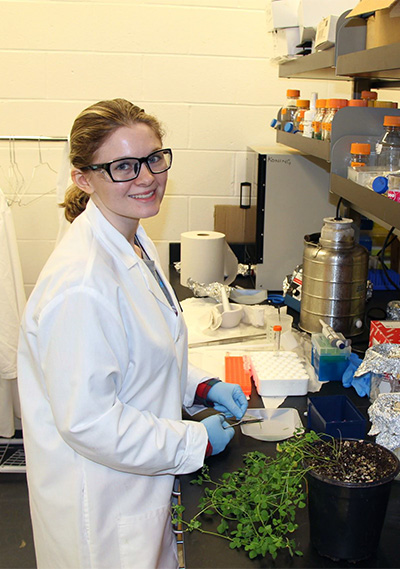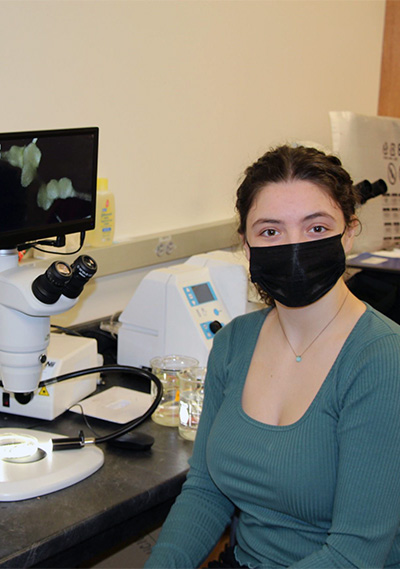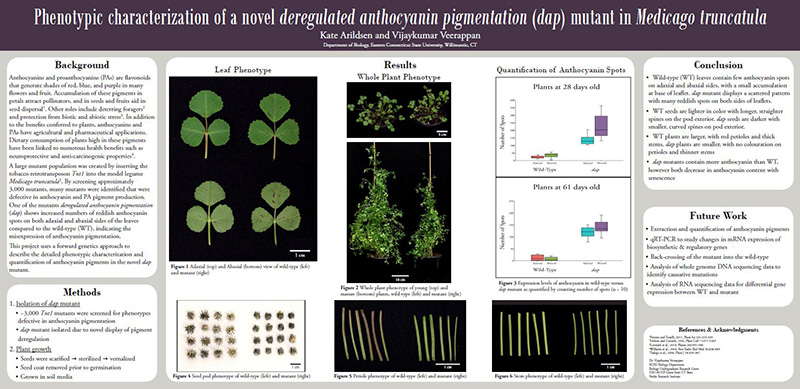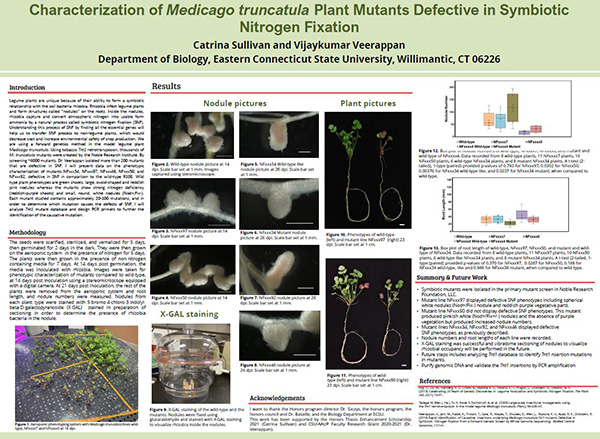- Apply
- Visit
- Request Info
- Give
Biology students present at plant biology world summit
Written by Dwight Bachman
Published on August 03, 2021
Biology majors Kate Arildsen ’22 and Catrina Sullivan ’22 presented research to the American Society of Plant Biologists (ASPB) during its 2021 Virtual Worldwide Summit held July 19-23.

Arildsen, who received a Conference Attendance Award from the ASPB, presented a poster illustrating her research on a novel mutant of the model legume “Medicago truncatula.”
“The mutant is unique because it produces a lot of red spots on its leaves, when normally the plant only has a few on its green leaves,” said Arildsen. “These red spots are where the pigment anthocyanin accumulates. We’re interested in what is going on in the plant’s genes that causes it to produce so much of this pigment. Evidence has shown a link between anthocyanin content and anti-inflammatory, antioxidant, anticarcinogenic and other protective properties. By studying this irregularly pigmented mutant, it can help other scientists to create more nutritious fruits and vegetables.”
Arildsen, whose research mentor is Vijay Veerappan, assistant professor of biology, said she appreciated the travel grant from ASPB that allowed her to experience the range of talks, workshops and posters that were presented.
“Amongst the countless informative lectures, I learned about improving presentations, plant bioinformatics resources and new research on the impact of climate change on plants. There were also some amazing workshops. I was happy to join an interactive game designed to give participants the tools to understand the various effects of systemic and institutional oppression. Two other particularly useful workshops were a panel on graduate school and one for creating an international career. Thanks to both of those, I have a few pages of notes on funding sources, helpful tips, and who to contact to jump start my future after Eastern.”

Sullivan’s research, also guided by Veerappan, focused on the “Characterization of ‘Medicago truncatula’ Plant Mutants Defective in Symbiotic Nitrogen Fixation.” This project has been in the works since January 2020. COVID-19 put the research on hold, but Sullivan was able to pick back up in the spring 2021 semester.
“My research goal was to determine which genes are effective in symbiotic nitrogen fixation,” said Sullivan. “Symbiotic nitrogen fixation (SNF) is the process plants use to convert nitrogen in the atmosphere into the usable form of energy — ammonia. Legumes are the only plant that are able to convert atmospheric nitrogen into usable ammonia, which is why the model legume Medicago truncatula is often studied."
Sullivan said identifying which genes are responsible for SNF is important for many reasons. All other plants obtain nitrogen they require for growth from the ground, which means synthetic nitrogen fertilizers are required for all non-legume plants. Synthetic nitrogen fertilizers are costly for farmers and the water runoff from fields contribute to environmental pollution. The factories where synthetic nitrogen fertilizers are made also contribute to air pollution.
“My research involves obtaining mutant lines of Medicago truncatula, which have random Tnt1 insertion mutations. The mutations occur in random genes, and if the mutant line is not able to perform SNF, that indicates the gene with the mutation is vital to the SNF process. If the genes which are responsible for SNF can be isolated, then other plants can potentially be genetically modified to include those genes. This would effectively eliminate or decrease the need for synthetic nitrogen fertilizers, which will reduce costs for farmers and decrease pollution.”




